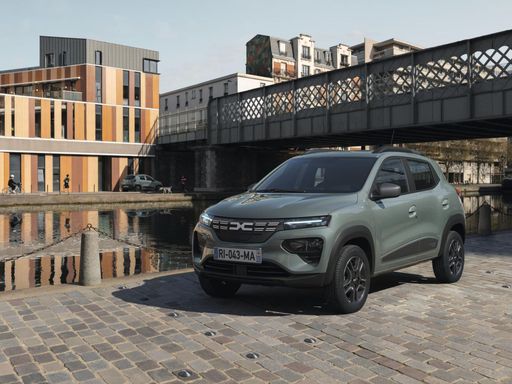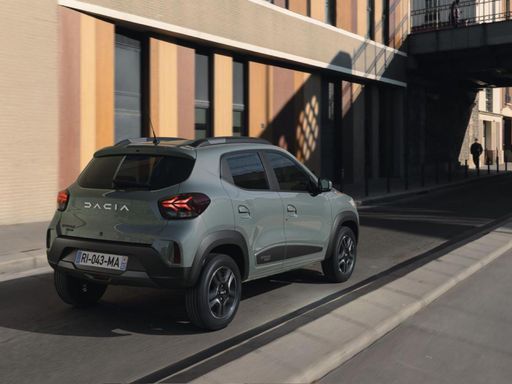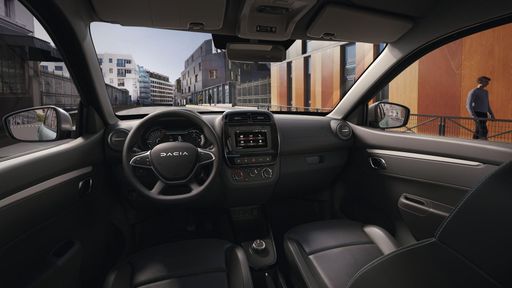Dacia Spring vs BYD Seal 6 – Differences & prices compared
Compare performance, boot space, consumption and price in one view.
Find out now: which car is the better choice for you – Dacia Spring or BYD Seal 6?
The Dacia Spring (SUV) comes with a Electric engine and Automatic transmission. In comparison, the BYD Seal 6 (Estate) features a Plugin Hybrid engine with Automatic transmission.
When it comes to boot capacity, the Dacia Spring offers 308 L, while the BYD Seal 6 provides 500 L – depending on how much space you need. If you’re looking for more power, decide whether the 65 HP of the Dacia Spring or the 212 HP of the BYD Seal 6 suits your needs better.
In terms of consumption, the values are 13.20 kWh per 100 km for the Dacia Spring, and 1.70 L for the BYD Seal 6.
Price-wise, the Dacia Spring starts at 14500 £, while the BYD Seal 6 is available from 36800 £. Compare all the details and find out which model fits your lifestyle best!
Dacia Spring
The Dacia Spring stands out as an affordable and environmentally friendly option in the electric vehicle market, combining practicality with a compact design ideal for urban settings. Its minimalist interior, while basic, provides all the essential features needed for a comfortable drive, reflecting its cost-effective approach. The vehicle's performance suits city driving, making it an appealing choice for those seeking an entry-level electric car.
details @ dacia-presse.de
@ dacia-presse.de
 @ dacia-presse.de
@ dacia-presse.de
 @ dacia-presse.de
@ dacia-presse.de
BYD Seal 6
The BYD Seal 6 is a captivating electric sedan that captures attention with its sleek design and modern aerodynamics. With a strong focus on sustainability, it offers an impressive electric driving experience, combining efficiency with cutting-edge technology. The Seal 6 stands out in the EV market for its luxurious interior and innovative features, making it a strong contender for drivers looking to embrace the future of transportation.
details

|
|
|
|
|
Costs and Consumption |
|
|---|---|
|
Price
14500 - 17100 £
|
Price
36800 - 42800 £
|
|
Consumption L/100km
-
|
Consumption L/100km
1.7 - 2.6 L
|
|
Consumption kWh/100km
13.2 - 14.1 kWh
|
Consumption kWh/100km
-
|
|
Electric Range
225 - 228 km
|
Electric Range
50 - 100 km
|
|
Battery Capacity
26.80 kWh
|
Battery Capacity
-
|
|
co2
0 g/km
|
co2
38 - 60 g/km
|
|
Fuel tank capacity
-
|
Fuel tank capacity
65 L
|
Dimensions and Body |
|
|---|---|
|
Body Type
SUV
|
Body Type
Estate
|
|
Seats
4
|
Seats
5
|
|
Doors
5
|
Doors
5
|
|
Curb weight
1013 - 1050 kg
|
Curb weight
1710 - 1805 kg
|
|
Trunk capacity
308 L
|
Trunk capacity
500 L
|
|
Length
3701 mm
|
Length
4840 mm
|
|
Width
1583 mm
|
Width
1875 mm
|
|
Height
1519 mm
|
Height
1505 mm
|
|
Payload
265 - 302 kg
|
Payload
435 kg
|
Engine and Performance |
|
|---|---|
|
Engine Type
Electric
|
Engine Type
Plugin Hybrid
|
|
Transmission
Automatic
|
Transmission
Automatic
|
|
Transmission Detail
Reduction Gearbox
|
Transmission Detail
CVT
|
|
Drive Type
Front-Wheel Drive
|
Drive Type
Front-Wheel Drive
|
|
Power HP
44 - 65 HP
|
Power HP
184 - 212 HP
|
|
Acceleration 0-100km/h
13.7 - 19.1 s
|
Acceleration 0-100km/h
8.5 - 8.9 s
|
|
Max Speed
125 km/h
|
Max Speed
180 km/h
|
|
Torque
113 - 125 Nm
|
Torque
-
|
|
Number of Cylinders
-
|
Number of Cylinders
4
|
|
Power kW
33 - 48 kW
|
Power kW
135 - 156 kW
|
|
Engine capacity
-
|
Engine capacity
1498 cm3
|
General |
|
|---|---|
|
Model Year
2024
|
Model Year
2025
|
|
CO2 Efficiency Class
A
|
CO2 Efficiency Class
B
|
|
Brand
Dacia
|
Brand
BYD
|
Dacia Spring
The Revolution of Affordable Electric Mobility: The Dacia Spring
The automotive world has witnessed remarkable advancements in electric vehicles (EVs), with the Dacia Spring emerging as a noteworthy contender in the affordable segment. Combining efficiency, affordability, and practicality, the Spring offers an intriguing prospect for eco-conscious individuals and city dwellers alike.
Powertrain and Performance: A Look Under the Hood
The Dacia Spring is equipped with an electric motor that delivers between 44 to 65 PS, translating into a versatile driving experience tailored to urban landscapes. It operates on a front-wheel-drive system, ensuring a familiar and manageable handling experience.
Dacia Spring's electric engine is paired with an automatic transmission, utilising a reduction gearbox. This setup allows for smooth acceleration and a top speed of 125 km/h, ensuring that everyday driving scenarios are handled with ease.
Efficiency and Range: Eco-Friendly without Compromise
Efficiency is a cornerstone of the Dacia Spring's design, boasting an energy consumption of just 13.2 to 14.1 kWh per 100 km. When fully charged, its 26.8 kWh battery offers a respectable range of 225 to 228 km, making it ideal for daily commutes and short trips.
Furthermore, the Spring takes pride in its commendable CO2-efficiency class A, emphasising its commitment to reducing environmental footprint with a zero-emission profile.
Design and Practicality: Compact yet Comprehensive
Lying in the SUV category, the Dacia Spring is compact with dimensions of 3701 mm in length and 1583 mm in width, making it a perfect match for urban environments where space is at a premium. Despite its modest size, it provides a generous boot space of 308 litres, ensuring practicality isn’t sacrificed.
Comfort and Interior: For the Everyday Journey
The Dacia Spring comfortably seats up to four passengers. The cabin offers a minimalist yet functional design, available in multiple trim lines including Essential, Expression, and Extreme, allowing customers to choose according to their taste and requirement.
With its ergonomic layout and simplicity, the interior is crafted to enhance the driving experience by focusing on essential needs, avoiding unnecessary distractions.
Affordability and Accessibility: Breaking Barrier
The Dacia Spring stands out in the electric vehicle market due to its affordability, with prices ranging from 16,900 to 19,900 €. This ensures that environmentally friendly transportation is accessible to a broader audience.
Additionally, the Spring allows for cost-effective maintenance and operational expenses, offering monthly running costs between 570 to 599 € and cost per km between 22.8 to 24 cents, making it an economical choice in the long run.
Final Thoughts: The Future of Urban Mobility
In summary, the Dacia Spring serves as a testament to how electric vehicles can be both affordable and practical, without compromising on essential features. Whether it is for the eco-conscious urbanite or those looking for a cost-effective daily driver, the Spring is positioned as a viable solution for navigating the future of urban mobility.
BYD Seal 6
BYD Seal 6: Unveiling a New Era in Hybrid Innovation
The BYD Seal 6 is a compelling addition to the modern automotive scene, bringing together an exquisite blend of performance, efficiency, and innovation. Its latest 2025 models have set the stage for a thrilling driving experience within the Plugin Hybrid domain, marking yet another milestone for BYD in the sustainable vehicle market.
A Closer Look at the Technical Aspects
As a technologically advanced hybrid wagon, the BYD Seal 6 is propelled by a powerful yet efficient engine. Available in variants ranging from 184 to 212 horsepower, this vehicle offers versatility in performance to suit different driving preferences. The Plugin Hybrid system incorporates cutting-edge technology designed to seamlessly integrate electric and gasoline power for a balanced and responsive drive.
With a 1.7 to 2.6 liters per 100 kilometers fuel consumption rate and an electric range of 50 to 100 kilometers, the Seal 6 demonstrates remarkable efficiency and reliability, making it a perfect companion for both urban and long-distance journeys. Front-wheel drive ensures a stable grip on the road, and the automatic CVT transmission eases driving tasks, delivering smooth and effortless gear shifts.
Design and Dimensions
Constructed with a keen eye for style and functionality, the BYD Seal 6 embraces the elegant form of a wagon. Measuring 4840 mm in length, 1875 mm in width, and 1505 mm in height, its dimensions offer a spacious interior without compromising on sleek aesthetics. The car comfortably seats five passengers, ensuring ample roominess and comfort for every occupant while offering a generous trunk capacity of 500 liters.
Performance and Handling
Designed to impress, the Seal 6 boasts a zero to 100 km/h acceleration time between 8.5 and 8.9 seconds and a maximum speed of 180 km/h. Its engine capacity of 1498 cm3 and the four-cylinder architecture provide a robust and stable foundation for a spirited driving performance. Coupled with a CO2 efficiency class B and emissions ranging from 38 to 60 g/km, it underscores BYD's commitment to environmentally responsible manufacturing.
Innovative Features and Safety
The Seal 6 is equipped with advanced safety and technological features that enhance the driving experience while ensuring peace of mind. This model not only prioritizes fuel efficiency and dynamic performance but also offers top-tier safety measures to protect its occupants. From intelligent safety systems to an aerodynamic design that minimizes drag, every detail reflects BYD's dedication to excellence.
Conclusion
In the ever-evolving landscape of hybrid vehicles, the BYD Seal 6 stands out with its compelling combination of power, efficiency, and elegant design. Whether you're looking for a sophisticated commuter or an adventurous travel companion, this car delivers beyond expectations. As BYD continues to innovate, the Seal 6 is a testament to the brand's vision for the future: a harmonious blend of technology and sustainable mobility.
Is the Dacia Spring offered with different drivetrains?
Available configurations include Front-Wheel Drive.
The prices and data displayed are estimates based on German list prices and may vary by country. This information is not legally binding.
